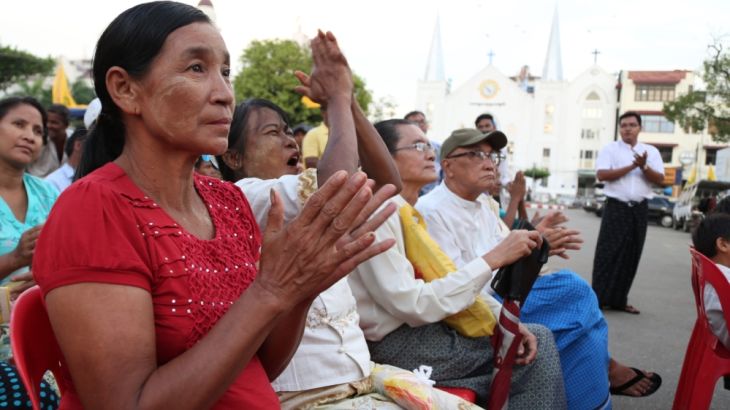Voting starts in Myanmar’s historic election
Around 30 million voters will pick among 6,065 candidates in country’s first openly-contested polls in 25 years.

Yangon, Myanmar – Voting is underway in Myanmar’s parliamentary elections, the first openly contested polls in 25 years, which could determine if the military-backed ruling party will hold on to power or lose to the opposition led by pro-democracy campaigner Aung San Suu Kyi.
Amid allegations of voting irregularities, around 30 million voters will cast their ballots on Sunday and pick among the 6,065 candidates to fill the two houses of the national parliament and regional assemblies.
Keep reading
list of 4 itemsMyanmar’s rebels see unity as key to victory over weakened military rulers
Concerns raised over Myanmar’s ailing Aung San Suu Kyi
Myanmar’s jungle war: ‘If I don’t die now, when will I?’
Thousands of people are lining up across Yangon and outside voting centres across the country waiting to vote, with many arriving at least 30 minutes prior to the opening of voting booths at 6am local time (23:30 GMT).
After a two-month campaign period, which saw the stripping of the right to vote of an estimated one million Rohingya Muslims, an attack on an opposition candidate, and deadly armed fighting in rebel-held areas in northern border states, a 24-hour break in electioneering was observed on Saturday ahead of the vote.
Myanmar Votes 2015: Voices from the heartland
Meanwhile, civil servants, police, election workers and accredited journalists had been allowed to vote in advance until Saturday.
Sunday’s election has been declared by the United Nations as a “watershed moment” in the country’s democratic transition, even as it urged the government of President Thein Sein “to ensure that respect for human rights is front and centre” in the run-up to the polls.
|
|
On Friday night, the president delivered a televised address urging eligible citizens to vote, while vowing that “the government and the army will respect the results” of the election. The statement followed allegations by Nobel winner Suu Kyi, who, on Thursday, told a packed news conference of incidents of voter fraud.
On Saturday, Human Rights Watch accused the head of the country’s election commission, U Tin Aye, of bias in favour of the ruling Union Solidarity and Development Party (USDP).
Suu Kyi’s National League for Democracy (NLD) is trying to wrest control of the lower and upper houses of parliament from the USDP.
A decisive NLD win would give the opposition the right to pick the next president, alongside the military, which retains 25 percent of the total number of parliamentary seats.
While Suu Kyi is barred by the current constitution from becoming president, an NLD majority would also allow her to manoeuvre politically, paving the way for constitutional amendments, and eventually an appointment to the presidency.
![Small national parties and regional ethnic parties could drain some support from the opposition NLD [Ted Regencia/Al Jazeera]](/wp-content/uploads/2015/11/8114a3834abf4198878fdb40ff95ca11_18.jpeg)
“It is not just a matter of winning the elections, but also forming the government,” she had declared.
Still, observers say a strong victory is not assured as the USDP maintains an organisational advantage, with many of its members coming from the military that ruled the country for decades. Smaller parties, including regional ethnic parties, could also drain support from Suu Kyi’s party.
In 1990, the NLD also swept the parliament, but the result was annulled by the military and Suu Kyi was placed under repeated house arrest until her release in 2010.
Vote for change
Sunday’s election also pits newcomers in politics against the old guard from the USDP.
In the state of Bago, 26-year-old Thu Ryain Shwe is running for a lower house seat against the incumbent Vice President U Nyan Htun, a USDP candidate and a former commander of Myanmar’s navy.
“I’m trying to send a message that the youth has the opportunity to become decision-makers and not just followers,” the National Unity Party candidate told Al Jazeera. “If we don’t do this, we are always going to be in a position of being subordinates.”

Thu Ryain Shwe said he wants to amend the law reserving 25 percent of the seats in parliament to the military.
He said that he was inspired by the late South African President Nelson Mandela to become a youth leader.
Foremost on voters’ minds in the upcoming election is economic development, said Yee Nan Theik, a trained medical doctor from Yangon.
Yee Nan Theik said financial difficulties forced him to quit his job at a government hospital.
“Our hospitals don’t have enough facilities. I even have to spend my own money to buy medicine for my patients,” he said.
It has been three years since he left his job in 2012, and he said he is happy pursuing his “true passion”, which is documentary film-making and painting. His film about an imprisoned political dissident won him the top prize at the of the Human Rights Human Dignity International Film Festival in 2013.
“I am not saying who I will vote for, but I think the nation is ready to vote for change,” he told Al Jazeera.
![As a doctor at a government hospital, Yee Nan Theik had to spend his own money to buy medicine for his poor patients [Ted Regencia/Al Jazeera]](/wp-content/uploads/2015/11/a9c9ed65a13a44aa87e5e41cf12f8f20_18.jpeg)